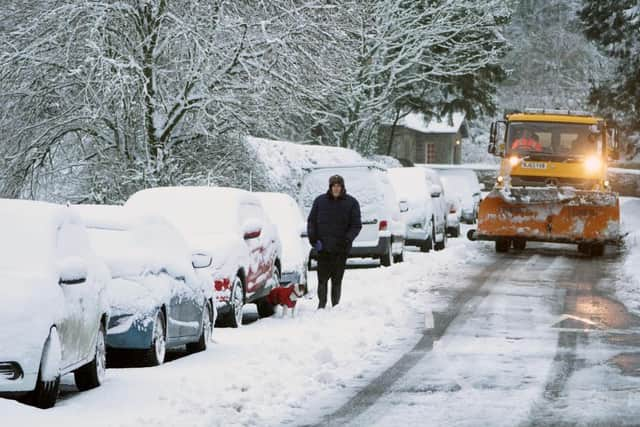Storm Christoph Scotland latest: what areas will be hit with more snow and ice - and what is the travel advice?
Yellow warnings are in place across the country, as parts of Scotland continue to face extreme weather brought by Storm Christoph.
The Met Office has put weather alerts in place for the north west, west and north of Scotland as snow and ice continue to cause dangerous conditions.
Advertisement
Hide AdAdvertisement
Hide AdAnd the forecaster has said the storm could be replaced by freezing temperatures over the weekend.


Police Scotland has urged people to avoid travelling in the affected areas.
It comes as many areas of the country woke up to heavy snowfall on Thursday (21 January) morning, which caused travel chaos.
Here’s everything you need to know about the latest weather warnings.
What areas are affected?
While most of the adverse weather occurred overnight on Wednesday (20 January) into Thursday (21 January), the Met Office has said further snow and ice caused by Storm Christoph is likely across Scotland.
Yellow weather warnings for ice for south west Scotland and the Borders, Strathclyde and the Highlands are in place until 10am on Friday (22 January).
That affects Argyll and Bute, East Ayrshire, Inverclyde, North Ayrshire and South Ayrshire, as well as Dumfries and Galloway and Na h-Eileanan Siar.
The Met Office states: “Further showers on Thursday night will leave surfaces wet. As ground temperatures fall below freezing, ice is likely to form in places.”
Snow is also possible on the higher parts of these areas.
Advertisement
Hide AdAdvertisement
Hide AdAnd there is a further yellow warning in place for snow in Central, Tayside and Fife, Grampian and the Highlands in place until noon on Friday.
Affected areas include Angus, Perth and Kinross, Aberdeenshire and Moray.
The Met Office said: “Spells of snow will continue for the rest of Thursday and through Friday morning. Snow will be heavy at times, especially above 200 m, with the heaviest snow occurring east of the Great Glen.”
Up to 10-20cm of snow is likely in higher areas.
On Wednesday, the yellow warning for south-east Scotland, covering the Borders, East and West Lothian and Midlothian, was upgraded to amber until 8am on Thursday.
Many of these areas woke up to heavy snow and travel disruptions on Thursday morning due Storm Christoph.
The Met Office said up to 30cm (12in) of snow was possible on the highest ground covered by the amber alert.
What is the current travel advice?
Police Scotland has urged people to avoid travelling in the places facing a yellow warning, and it has reminded the public that Covid-19 travel restrictions should still be adhered to.
Chief Superintendent Louise Blakelock said: "Government restrictions on only travelling if your journey is essential remain in place and with an amber warning for snow, please consider if your journey really is essential and whether you can delay it until the weather improves.
Advertisement
Hide AdAdvertisement
Hide Ad"If you deem your journey is essential, plan ahead and make sure you and your vehicle are suitably prepared by having sufficient fuel and supplies such as warm clothing, food, water and charge in your mobile phone in the event you require assistance."
Due to the stormy weather, the Queensferry Crossing was closed in both directions early on Thursday due to the risk of falling ice – but it is now open again.
Transport Scotland has said it is "closely monitoring" the road network and a response team would be operational while the weather warnings are in place.
Scotland’s Transport Secretary Michael Matheson said: "The current Covid restrictions mean you should only be leaving your home for an essential purpose, so please consider if your journey is absolutely necessary before setting off.
"The forecast snow has potential to cause difficult driving conditions and disruption to the wider transport network, so if you have to make an essential journey during the warning period it's important you plan your journey, drive to the conditions and follow Police Scotland travel advice."